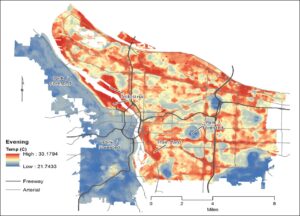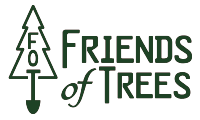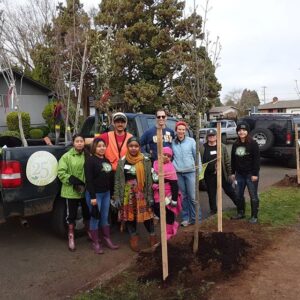Robert Wood Johnson Foundation funds tree equity project
Robert Wood Johnson Foundation partnership focuses on climate change & community health
Does a community based tree planting program help create a more resilient community? We know that low-income, historically under-served communities – often communities of color – experience the most severe consequences of climate change; part of the reason is that so many low-income communities have so few trees and are missing out on trees’ many benefits (more on that below). A new community partnership with the Robert Wood Johnson Foundation is exploring a better understanding of the comprehensive benefits that trees and community engagement provide.
This partnership is a collaborative research project examining the physical and social dimensions of a community tree planting program as a strategy to improve public health and mitigate climate change. This work includes a local community advisory board, collection and analysis of resident survey data, and the physical analysis of a changing urban tree landscape using data from Friends of Trees’ 30 years of planting trees, focusing on East Portland’s Jade District.
APANO (Asian Pacific American Network of Oregon); Portland State University professors Vivek Shandas (School of Urban Studies) and Ryan Petteway (School of Public Health); Willamette Partnership; and Meyer Memorial Trust join Friends of Trees and the Robert Wood Johnson Foundation as partners in this project. PSU is the lead investigator for the project, managing research design; APANO leads community outreach and engagement as well as the coordination of the community advisory board; and Willamette Partnership is supporting survey design, analysis and communication of lessons learned. Given our 30 years of tree planting and community engagement experience (and thus 30 years of data) Friends of Trees is the project lead, helping develop and collect community surveys, recruit for the community advisory board, and share planting data.
“While climate change can harm the health of anyone in America, some communities and groups of people are more likely than others to be harmed,” said Dr. Mark Mitchell, a public health and environmental health physician. “Climate change exacerbates health disparities in the most vulnerable communities, including tribal communities, communities of color, and low-income communities. That is why culturally relevant solutions that address health equity are critical to creating climate resilience.”

Our community is one of seven across the United States where RWJF is studying health, health equity and climate change solutions. This is a multi-year project, and we’ll share periodic updates along with results at project completion. For more information on health and climate solutions, visit healthandclimatesolutions.org.
Top photo: Friends of Trees planting event in East Portland, February 2020.
Heat map image courtesy of Sustaining Urban Places Research (SUPR) Lab, Portland State University.

